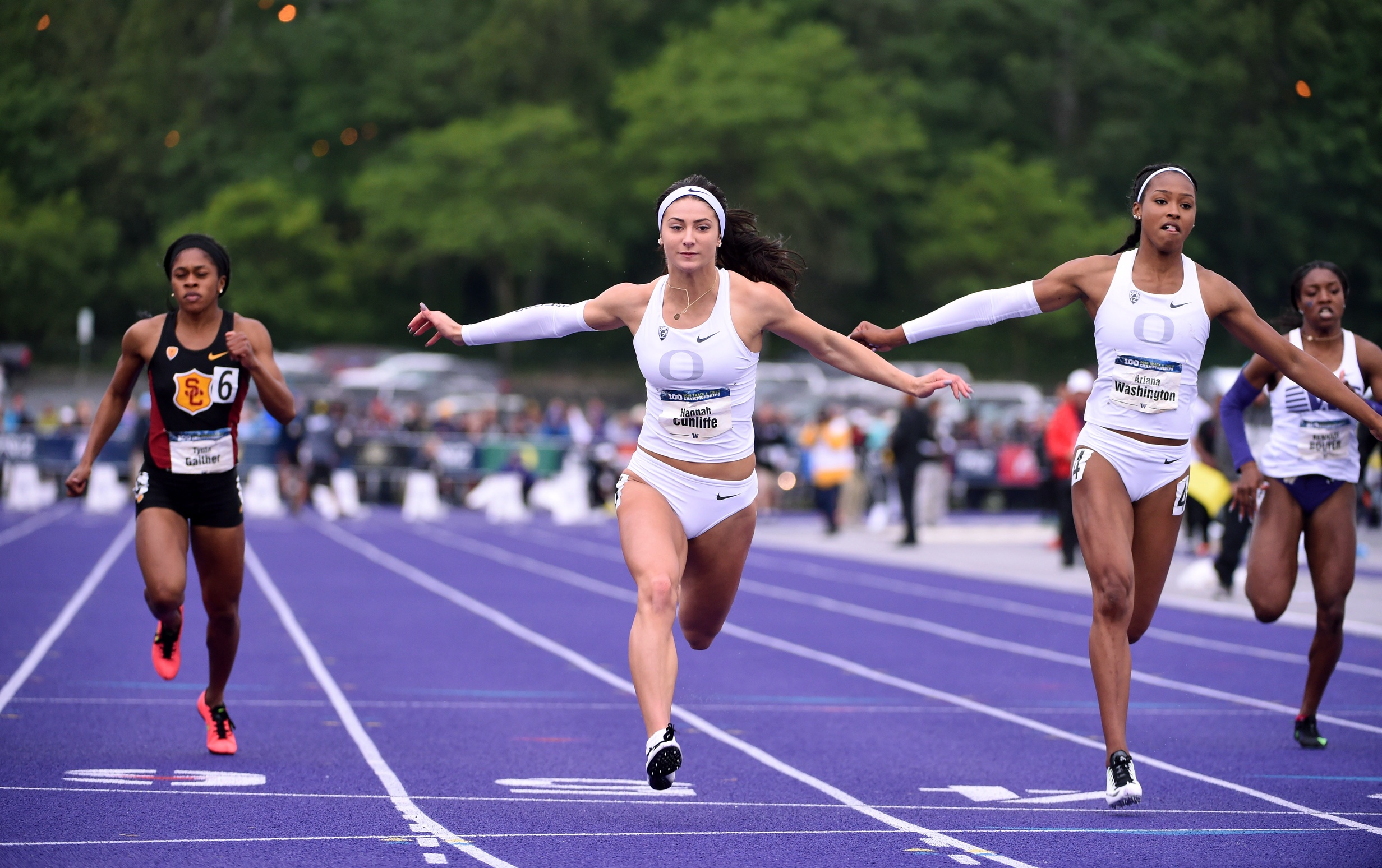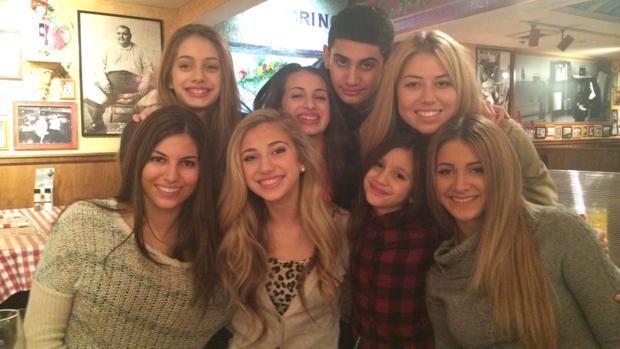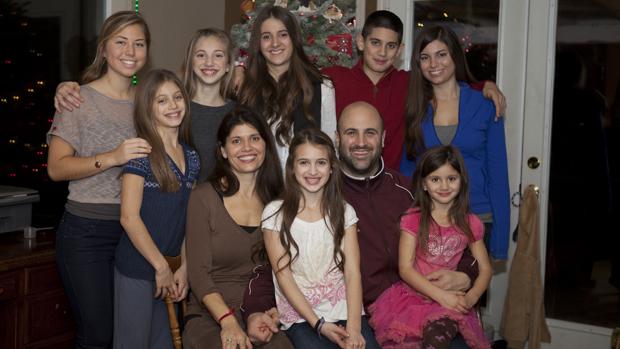

Photo: USA TODAY Sports - Kirby Lee
Coach Mike Cunliffe is considered one of the master coaches in the short to long sprint method. He has trained world class track & field athletes, from elite youth as young as 8, to Olympic level in sprints and jumps. He's currently working with Olympians from four different federations ahead of this summer's IAAF World Championships in London.
In the US, his youth athletes have achieved multiple national sprint titles and age group world records in the sprints and jumps. One of these athletes includes his daughter, Hannah, who just won the 60m title for the University of Oregon at the NCAA Indoor Championships. We caught up with Mike to get his philosophies on coaching and parenting.
When did you know that Hannah was going to be special?
My wife and I take the view that each child is special and unique. Talents can come in many forms, not just physical, so we look to encourage the kids in a natural direction where their talents are and allow them an organic platform in those activities. With Hannah, we saw how fast she was at age 5. In fact, it was earlier than that. She could crawl at near the speed of light. It was amazing how fast she could cover ground. So, it was all about opportunities to run and developing a love for your talent at a young age, combined with training in a healthy framework through each developmental phase, which is critical for future success.
How do you think your training philosophy differs from other coaches?
We train with a true power/speed (CP-ATP, Anaerobic Glycolytic) approach to the physiology in relation to the physics of the short sprints, and then stretch with appropriate flavors of lactic for the longer sprints. This is from youth to senior. Our priority focus is on making someone faster; specifically Maximum Velocity, when a lot of coaches and teams emphasize strength work in various flavors.
In regard to youth, it's ALL developmental. There are things to train and things to stay away from through the various growth phases, and they're not what is often touted as such.
The key to youth training is to build a FUTURE.
Hint: Think of what kind of reserve you want to be able to call on for the rest of their life once through puberty. Then build it. While you do that you can win but don't do it at the expense of tomorrow. Now there are times I know I can pull a lever on a youth athlete to get a cheap win but the key is to not touch it until later. Note: It's cheap if it detracts from their future.
How does it feel for you now that Hannah has won her first national title?
I was a proud dad, of course, and really I was very happy for Hannah because I know how much she wanted to win that 60m title. It was the first time I saw her race outside of Seattle since 2013 so it was special. We have so many kids so we try and focus on being a support as a family daily and weekly, talking with one another and supporting one another since we have kids all over, from Kansas to Dubai. So going to events is special because we are spread so thin in regards to time. As a dad and coach, it's a lot of fun enjoying the results from the work her and Curtis Taylor are putting in. Curtis and Hannah are doing a fantastic job together and I'm a proud parent without the coaching pressure. I sleep better at night knowing Hannah is in good hands and it allows me to enjoy the parent role which I'm thankful for.

How difficult is it to balance the coach and parent relationship simultaneously?
The two are interrelated; all parents are coaches. We are life coaches providing direction into multiple areas of our children's lives (intellectual, emotional, physical, etc.). 99% of the time this means selecting SME's (Subject Matter Experts) to help bring depth and growth to a certain area.
For instance, math. You may pick a school because of its acclaimed math department. The math teachers there have been chosen to enhance your child's skills in that area. Or you hire a personal trainer in football, etc. So for my wife and I, coaching our kids and parenting our kids are the same. But no one will love them as we do as parents. As parents we have a unique tool set grounded in love helping them to live a fulfilling life. We teach the kids if they do sports (not all of our kids do) to be smart and use the resources around you to reach your goals. If one of us is an expert in an area they are in need of help in then leverage our lessons and knowledge for your own success.
As all parents have experienced it can be challenging because having parental insight and professional knowledge you have more details into your kid's lives. Combine that with the emotions of the teenage years- it's a big learning cycle. Eventually, they make better and better decisions and it gets way easier on them to reach their goals. Now Hannah and I can have some very detailed conversations and she is both engaged and able to comprehend the subject matter.
What advice would you give parents on getting their children to maximize their abilities?
My wife and I view ourselves as fiduciaries of God's kids. They belong to God; we are responsible to raise them the best we can in love and provide a structure that helps each of them develop their talents to their fullest. At times, that may mean we can see the path better than them and will require them to "hold their vision" without compromise.
As their emotional IQ grows we've found that the training wheels come off and we have adult children capable of making great decisions. The get along piece comes with proper perspective. Each person is given certain talent and it's for each person to develop that talent with the encouragement and support of the family. It doesn't mean equality in talent as we strive for each family member to achieve at their highest level while making quality choices.
It's all grounded in character choices. I choose to wake up and get my work done. I choose to work hard all day. I choose to have a positive attitude, etc. If someone is off track the family is there to encourage and build them back up and hold them accountable to the winning standard of character (give a 100% each day).
Do we all fall? Absolutely. It's not about whether you fall down it's about always keeping your eyes on your own personal goals and making the best decisions each day to you get there. They learn that other people's success doesn't detract from their own and it allows them to be focused on their own progress thus freeing them to enjoy and draw fuel from their siblings' achievements. Sometimes someone can feel off track and we come along side and map out details to go forward. As long as our children can see a path to success and are able to tangibly build toward it each day they feel empowered.
READ MORE: The NCAA Has Never Seen A Sprinter Like Hannah Cunliffe - FloTrack
In retrospect what about Hannah's experience has made her so strong?
Hannah has always been strong willed. But a strong will (stubbornness, I prefer determination) is only an asset if the person with this trait makes good decisions; grounded in knowledge and wisdom. Are they determined about making sure they get up on time and get to class or are they stubborn about some negative aspect hindering their own forward progress in life?
So with a strong willed person you must use information/knowledge as a key combined with wisdom which is the highest possible application of that knowledge; making the right decision regardless of what emotion they may or may not be experiencing.
Hannah's competitiveness comes a lot from competing with her brother Samuel, who growing up was her best friend and his friends were her friends in many instances. Although Hannah is a girly girl, she's also tough as nails having to compete with Sam (Kansas basketball) and his friends JaShaun Agosto (LIU basketball), Davine Tullis (Hawaii football), Gavin Robertson (Arizona football), and Oshea Trujillo (Idaho State football) growing up. She ran her reps in practice against these boys most of her youth days (age 8 on up) so competing hard was the norm and toughness was baked in. It's just how you do it.
How have you managed her career to this point to allow her to succeed at such a high level?
A long term development plan was mapped out in her youth that is now allowing her to succeed as an adult athlete. There was wise council provided in her youth that built a platform for future success in regards to sprinting with an emphasis on top-end speed.

You can watch Hannah Cunliffe and the University of Oregon women race LIVE at the Brooks Mt. SAC Relays April 13-15 on FloTrack.



